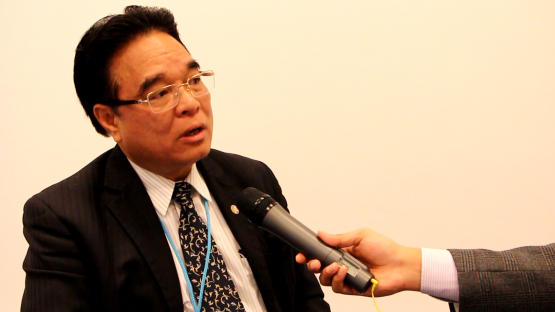Professor Vong Hu Tan is the Director-General of the Vietnam Agency for Radiation and Nuclear Safety (VARANS). He has also served as the country's National Liaison Officer, facilitating cooperation between the IAEA and Viet Nam. We caught up with Professor Vong in Vienna this February while he was attending a meeting at the IAEA headquarters, and asked him to tell us about Viet Nam's rich history of collaboration with the IAEA's technical cooperation programme.
Technical Cooperation (IAEATC): Professor Vong, what are the significant achievements of Viet Nam in advancing the application of nuclear science and technology for development?
Professor Vong: With regard to the application of nuclear energy in general, and nuclear techniques in particular, we have done a lot across many fields-not only in power generation, but also in healthcare, agriculture, industry and water resource management. I can tell you that we receive a lot of benefits from IAEA support and, based on that, we have managed to make significant achievements in the fields I mentioned before.
Agriculture is a good example. Viet Nam is an agricultural country. We learned how to implement many nuclear techniques in agriculture, such as mutation breeding, which we used to create many varieties of plants, from rice to soy bean. So far, we have more than 50 varieties of mutated plants. Half of the soy bean production [in Viet Nam] uses the mutation-bred seeds.
In healthcare, we have also achieved a lot, and I'm happy to mention a few indicators. As you know, in Viet Nam we have a small research reactor. We already use it very effectively to produce radiopharmaceuticals. Each year, we produce about 20 kinds of radiopharmaceuticals for domestic application. We've also developed a very good nuclear medicine network in the country-we have 25 nuclear medicine facilities around the country.
We also use the tracer technique for the oil and gas industry. And in water management, we use the isotope hydrology technology to manage our water resources in the country. In the energy sector, as you know now, we are introducing nuclear power to the country. With the assistance of the IAEA, we developed the necessary infrastructure in order for our government to launch a nuclear power plant in Viet Nam. So far, two nuclear power projects have been initiated and are ongoing in Viet Nam.
IAEATC: How has the TC Programme, and in particular PACT, helped Viet Nam to address its cancer burden?
Professor Vong: [The IAEA helped] through a number of nuclear applications and techniques. I can mention the support we received from IAEA and PACT experts. [The IAEA] arranged scientific visits for our local experts, after which they could develop the country's nascent program for cancer, including early detection and treatment. They also helped us to develop the Action Plan for the Promotion of Radiation and Radioisotopes for Healthcare. Secondly, the IAEA helped to train our people: Our medical physics, radiotherapists and experts in nuclear medicine. Finally, the IAEA provided equipment to Viet Nam, including a brachytherapy unit. We also received a simulator for therapy, in addition to a dose-calibrator for nuclear medicine.
IAEATC: And how has the IAEA TC programme support the construction of the nuclear power plant (NPP)?
Professor Vong: Yes, the IAEA has been very important in that process. I can name some very big projects we participated in. The first project concerned the development of infrastructure for a nuclear power plant-it concerns many things! According to the Milestone Report of the IAEA, there are 19 issues related to infrastructure. This project focused on the needs during the first phase of NPP construction. The second project, which was also very big, dealt with capacity building for nuclear regulators. These regulators would manage the security, safety and safeguards of nuclear power plants in Viet Nam.
IAEATC: One last question: how important is this nuclear power plant to Viet Nam?
Professor Vong: Nuclear power is one way to ensure the energy security of our country. After our government introduced a renovation policy, the economy developed very fast. Well, the energy needs also developed very fast. We already almost used all the domestic energy resources, so we have to think how we can use other resources, including nuclear, to meet our development demands.
IAEATC: Thank you very much, Professor Vong.
-- Produced by Steve Thachet, IAEA Office of Public Information and Communication, and Omar Yusuf, Technical Cooperation Communication Team


